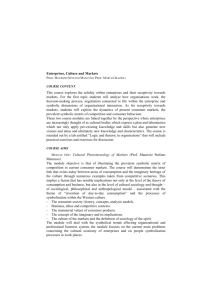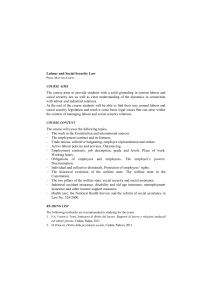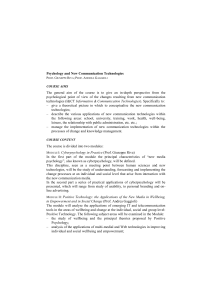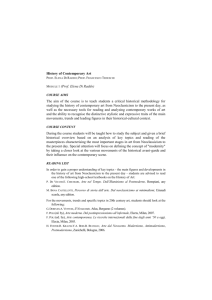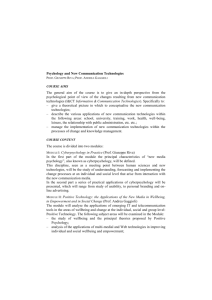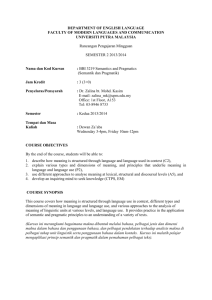Enterprises, Culture and Markets
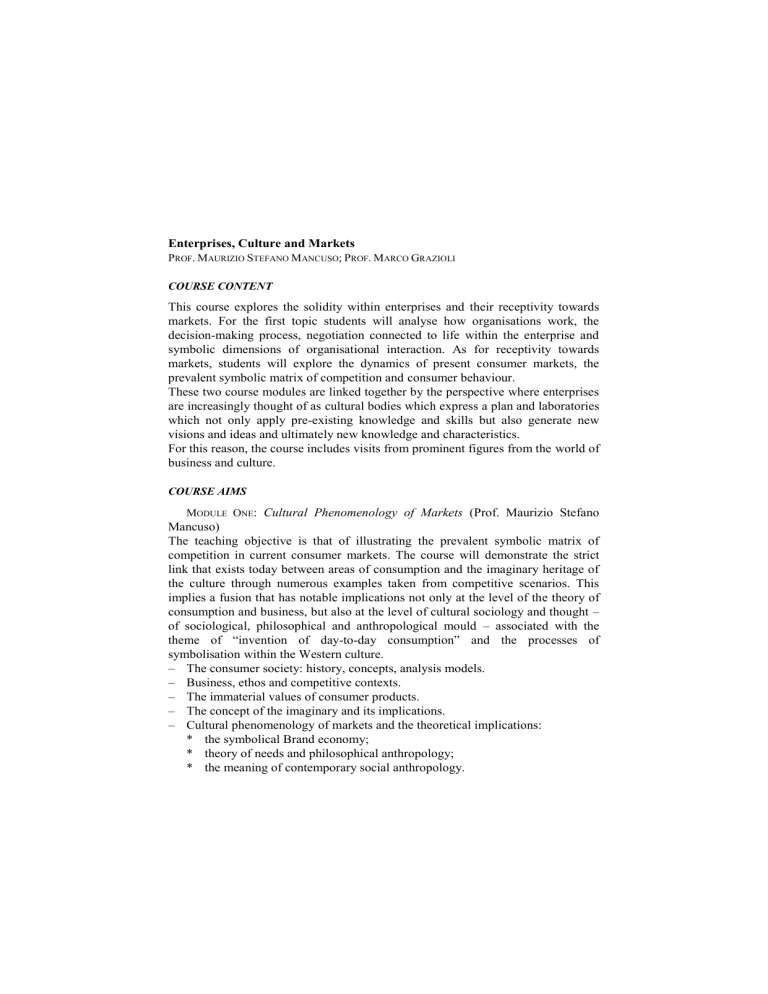
Enterprises, Culture and Markets
P
ROF
.
M
AURIZIO
S
TEFANO
M
ANCUSO
; P
ROF
.
M
ARCO
G
RAZIOLI
COURSE CONTENT
This course explores the solidity within enterprises and their receptivity towards markets. For the first topic students will analyse how organisations work, the decision-making process, negotiation connected to life within the enterprise and symbolic dimensions of organisational interaction. As for receptivity towards markets, students will explore the dynamics of present consumer markets, the prevalent symbolic matrix of competition and consumer behaviour.
These two course modules are linked together by the perspective where enterprises are increasingly thought of as cultural bodies which express a plan and laboratories which not only apply pre-existing knowledge and skills but also generate new visions and ideas and ultimately new knowledge and characteristics.
For this reason, the course includes visits from prominent figures from the world of business and culture.
COURSE AIMS
M
ODULE
O
NE
: Cultural Phenomenology of Markets (Prof. Maurizio Stefano
Mancuso)
The teaching objective is that of illustrating the prevalent symbolic matrix of competition in current consumer markets. The course will demonstrate the strict link that exists today between areas of consumption and the imaginary heritage of the culture through numerous examples taken from competitive scenarios. This implies a fusion that has notable implications not only at the level of the theory of consumption and business, but also at the level of cultural sociology and thought – of sociological, philosophical and anthropological mould – associated with the theme of “invention of day-to-day consumption” and the processes of symbolisation within the Western culture.
– The consumer society: history, concepts, analysis models.
– Business, ethos and competitive contexts.
– The immaterial values of consumer products.
– The concept of the imaginary and its implications.
– Cultural phenomenology of markets and the theoretical implications:
* the symbolical Brand economy;
* theory of needs and philosophical anthropology;
* the meaning of contemporary social anthropology.
* an outline of Sociology of the Spirit.
The module will deal with the symbolical trends effecting organizational and professional business system; the module focuses on the current main problems concerning the cultural economy of enterprises and on people symbolization processes in work places.
M
ODULE
T
WO
: Decision-making and Negotiating Processes (Prof. Marco
Grazioli)
The course aims to give students theoretical and practical knowledge of the workings of complex organisations as regards decision-making processes
(strategic, allocative and operative) and both internal and external negotiation.
Students will focus their studies on large-scale, national and global organisations and institutions.
The course concentrates on two particular aspects of management of organisational processes:
1. organisational efficiency in relation to highly complex decisions;
2. negotiation and conflict management.
These two aspects will be further broken down into the topics indicated below.
1. Organisational efficiency in relation to highly complex decisions:
– organisational efficiency: models and metaphores;
– the governing system;
– committee and meeting systems;
– the management of equity: from democracy to metric;
– the definition of rules and decision-making;
– the relationship between decision-making systems and leadership models;
– behaviour which facilitates the management of organisational arenas.
2. Negotiation and conflict management:
– economic analysis and the opportunity to negotiate or to oppose;
– the relationship between organisational theory and negotiation models;
– the difference between negotiation and mediation;
– complexity and repetition as strategic variables during negotiation;
– preparing for complex negotiation;
– management techniques;
– examples of and procedures for negotiation.
READING LIST
For Module One
M.
D E C ERTEAU , L’invenzione del quotidiano, Edizioni Lavoro, 2001 (Introduction, chap. 3 Modi d’uso, arti e tattiche ; chap. 7 Camminare per la città ; chap. 9 Lo spazio come racconto ; chap.
12 Leggere: una caccia di frodo ).
P.
B ERGER -T.
L UCKMANN , La realtà come costruzione sociale, Il Mulino, 1997 (Introduction, Chap. 1
I fondamenti della conoscenza nella vita quotidiana ; Chap. 2 La società come realtà oggettiva ).
A.
G EHLEN , L’uomo, Feltrinelli, 1990 (introductory section).
E.
C ASSIRER , Saggio sull’uomo, Armando, 2004.
M.S.
M ANCUSO , Le frecce dell’eroe – Le figure mitiche della giovinezza da Dioniso alla pubblicità dei jeans, Angeli, 2005.
P ERELMAN -O LBRECHTS -T YTECA , Trattato dell’argomentazione, Einaudi, 2001 (reprint).
Teaching materials edited by Maurizio S. Mancuso.
Further information about reading list will be provide throught the course.
For Module Two
J.G.
M ARCH , Decisioni e organizzazioni, Il Mulino, 1993.
F ISHER -U RY , L’arte del negoziato, Mondadori, 2005.
M.U.
G RAZIOLI
(edited by), Cambiamenti, Rubbettino, 2012.
D.
K AHNEMAN , Pensieri lenti e veloci, Mondadori, 2013.
Further readings
M.
A LVESSON , Prospettive culturali per l’organizzazione, Guerini e associati, 1996.
J.
C OLEMAN , Foundations of social theory, The Belknap Press of Harvard University Press, 1990.
M.
D OUGLAS , Credere e pensare, Il Mulino, 1994.
M.
G RANOVETTER , La forza dei legami deboli, Liguori, 1993.
A.O.
H IRSCHMAN , Lealtà, defezione, protesta, Bompiani, 1982.
A.
L OMI , Reti organizzative, Il Mulino, 1991.
D.C.
N ORTH , Istituzioni, Cambiamento istituzionale, evoluzione dell’economia, Il Mulino, 1994.
M.
O LSON , La logica dell’azione collettiva, Feltrinelli, 1983.
A.
P IZZORNO , Perché si paga il benzinaio. Per una teoria del capitale sociale, in A.
B AGNASCO -F.
P ISELLI -A.
P IZZORNO -C.
T RIGILIA
, Il capitale sociale , Il Mulino, 2001.
E.H.
S CHEIN , Cultura d’azienda e leadership. Una prospettiva dinamica, Guerini e ass., 1990.
D E M ASI , L’emozione e la regola, Rizzoli, 2005.
T ILLY -C HARLES -T ARROW -G.
S IDNEY , La politica del conflitto, B. Mondadori.
Further reading information will be given during the course.
TEACHING METHOD
For Module One
Multimedia materials, in particular advertising spots and semiotic analysis of consumer products, will be used during lectures. Group work and individual research projects is planned and encouraged.
For Module Two
Lectures. Case analysis. Monitored simulations and exercises.
ASSESSMENT METHOD
For Module One
Oral exam and possible dissertation.
For Module Two
Oral examination based on three of the listed texts (full-time students) and four of the listed texts (distance-learning students).
Students will be assessed on their active involvement in lectures and exercises and will count towards their final mark.
NOTES
Further information can be found on the lecturer's webpage at http://docenti.unicatt.it/web/searchByName.do?language=ENG, or on the Faculty notice board.
